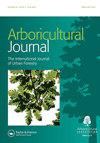Colonisation of farmland deciduous plantations by woodland ground flora
Q3 Agricultural and Biological Sciences
引用次数: 1
Abstract
ABSTRACT Newly planted broadleaved woodlands under agri-environment schemes lack floral diversity. The dispersal range and colonisation rates of herbaceous ground flora in thirty newly planted broadleaved woodlands in Northern Ireland were investigated during spring and early summer (2017). The colonisation rates of 14 species conventionally recognised as Ancient Woodland Indicator Species (AWIS) and Woodland Indicator Species (WIS) together with Lesser Celandine were assessed and the maximum dispersal distances from potential source populations was measured. The study found that the nine selected AWIS colonise new habitats significantly more slowly (p < 0.001) than the four woodland study species and colonisation rates corresponded approximately to the classifications AWIS and WIS. The effect of twelve selected habitat variables on species colonisation rates revealed that greater species dispersal range was associated with the management of the sources both within and bordering to the newly planted broadleaved woodlands. Ensuring connectivity to mature deciduous woodlands with an integrated, riparian zone together with a mosaic of inter-connected, species-rich hedges increased species dispersal. These results suggest succession from grassland into woodland only begins with the planting of trees. Colonisation of woodland plant species should be a key objective of establishing newly planted broadleaved woodlands within farmland afforestation schemes and should be facilitated by active management practices.林地植物群对农田落叶人工林的殖民作用
农业环境方案下新种植的阔叶林地缺乏植物多样性。在春季和初夏期间调查了北爱尔兰30个新种植的阔叶林地的草本地面植物的扩散范围和定殖率(2017年)。对14种传统上被认为是古老林地指示种(AWIS)和林地指示种(WIS)以及小白菜的定殖率进行了评估,并测量了潜在源种群的最大扩散距离。研究发现,9种选择的AWIS在新栖息地的定殖速度显著低于4种林地研究物种(p < 0.001),定殖率与AWIS和WIS的分类大致对应。12个选择的生境变量对物种定殖率的影响表明,更大的物种扩散范围与新种植的阔叶林地内部和边缘的资源管理有关。确保与成熟的落叶林地的连通性,一个完整的河岸带,以及一个相互连接的马赛克,物种丰富的树篱,增加了物种的分散。这些结果表明,从草地到林地的演替只从树木的种植开始。林地植物物种的定植应是在农田造林计划内建立新种植的阔叶林地的一个关键目标,并应通过积极的管理措施加以促进。
本文章由计算机程序翻译,如有差异,请以英文原文为准。
求助全文
约1分钟内获得全文
求助全文
来源期刊

Arboricultural Journal
Agricultural and Biological Sciences-Agronomy and Crop Science
CiteScore
2.40
自引率
0.00%
发文量
28
期刊介绍:
The Arboricultural Journal is published and issued free to members* of the Arboricultural Association. It contains valuable technical, research and scientific information about all aspects of arboriculture.
 求助内容:
求助内容: 应助结果提醒方式:
应助结果提醒方式:


